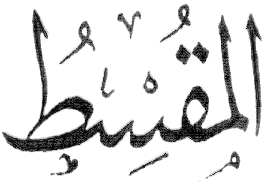

According to Dr Sharib:
"Al-Muqsit is the One Who is just and equitable, and Who takes revenge
on the oppressor for the oppressed."
To emulate the name we are advised to try to dispense justice and bring
about reconciliation between the oppressor and the oppressed.
Appropriate recitation will purify the heart of negative thoughts and may
enable one to achieve one's object.
see 'The 99 Most Beautiful Names of Allah' by Dr Zahurul Hassan Sharib
Some other references:
We shall set up scales
Of justice for the Day
Of Judgement, so that
Not a soul will be dealt with
Unjustly in the least.
And if there be
(No more than) the weight
Of a mustard seed,
We will bring it (to account)
And enough are We
To take account.
Al-Ghazali refers to Al-Muqsit as the one who demands justice for the
wronged from the wrongdoer. Its perfection lies in the person who
wrongs satisfying the one he has wronged.
He recites a story told of the holy Prophet Muhammed.
It appears that the holy Prophet was asked once as to why he was
laughing so much. He said that he has seen two Muslims before the
throne of the Lord of Power. One asked for restitution for wrongs done to
him by the other. God told the second Muslim to do so but he replied he
had no good deeds left. God asked the petitioner what he would do with
his brother as he had no good deeds left. Upon which he asked his Lord
to let the other Muslim relieve him of some of his burden of sins.
God showed the wronged one paradise with its wondrous palaces of
silver and gold and pearls. The Muslim inquired as to which Prophet or
martyr this belonged. God told him it belonged to the one who could pay
the price. "Who can pay such a great price?" he asked. Whereupon his
Lord told him that it was within his own power - by forgiving his brother.
He said immediately "I have already forgiven him." So God, great and
glorious told him to take his brother by the hand and to lead him into
paradise.
Al-Ghazali goes on to point out that the man who has the greatest share
in this name is the one who demands justice from himself for others, then
from one for another, but forbears to ask justice from another for himself.
(Al-Ghazali - The Ninety-nine Beautiful Names of God. Trans. Burrel/Daher: ITS: 1992.)
In the Sufi way it is a good practice to take account, at the end of the
day, of the things in which we may have harmed or have been unjust to
others - however small - and if no way of restitution exists at least resolve
not to repeat such a mistake. If, after soul searching, we find that we
have a legitimate grievance because of an injustice perpetrated by
another on us, we may refer our injustice into the hands of Almighty God,
and then dismiss the matter. It is even better if we can find it in our heart
to forgive such an injustice. According to Shah Wali Ullah of Delhi the
love of justice is the highest of the cardinal moral virtues which attracts
the attention of the pure souls.
By this means we start the next day with a clean sheet.
JMZ
"Al-Muqsit is the One Who is just and equitable, and Who takes revenge
on the oppressor for the oppressed."
To emulate the name we are advised to try to dispense justice and bring
about reconciliation between the oppressor and the oppressed.
Appropriate recitation will purify the heart of negative thoughts and may
enable one to achieve one's object.
see 'The 99 Most Beautiful Names of Allah' by Dr Zahurul Hassan Sharib
Some other references:
We shall set up scales
Of justice for the Day
Of Judgement, so that
Not a soul will be dealt with
Unjustly in the least.
And if there be
(No more than) the weight
Of a mustard seed,
We will bring it (to account)
And enough are We
To take account.
Al-Ghazali refers to Al-Muqsit as the one who demands justice for the
wronged from the wrongdoer. Its perfection lies in the person who
wrongs satisfying the one he has wronged.
He recites a story told of the holy Prophet Muhammed.
It appears that the holy Prophet was asked once as to why he was
laughing so much. He said that he has seen two Muslims before the
throne of the Lord of Power. One asked for restitution for wrongs done to
him by the other. God told the second Muslim to do so but he replied he
had no good deeds left. God asked the petitioner what he would do with
his brother as he had no good deeds left. Upon which he asked his Lord
to let the other Muslim relieve him of some of his burden of sins.
God showed the wronged one paradise with its wondrous palaces of
silver and gold and pearls. The Muslim inquired as to which Prophet or
martyr this belonged. God told him it belonged to the one who could pay
the price. "Who can pay such a great price?" he asked. Whereupon his
Lord told him that it was within his own power - by forgiving his brother.
He said immediately "I have already forgiven him." So God, great and
glorious told him to take his brother by the hand and to lead him into
paradise.
Al-Ghazali goes on to point out that the man who has the greatest share
in this name is the one who demands justice from himself for others, then
from one for another, but forbears to ask justice from another for himself.
(Al-Ghazali - The Ninety-nine Beautiful Names of God. Trans. Burrel/Daher: ITS: 1992.)
In the Sufi way it is a good practice to take account, at the end of the
day, of the things in which we may have harmed or have been unjust to
others - however small - and if no way of restitution exists at least resolve
not to repeat such a mistake. If, after soul searching, we find that we
have a legitimate grievance because of an injustice perpetrated by
another on us, we may refer our injustice into the hands of Almighty God,
and then dismiss the matter. It is even better if we can find it in our heart
to forgive such an injustice. According to Shah Wali Ullah of Delhi the
love of justice is the highest of the cardinal moral virtues which attracts
the attention of the pure souls.
By this means we start the next day with a clean sheet.
JMZ









| Bismillah ir Rehman ir Rahim |
| The Equitable The Ultimately Equitable One, |





Wa-naza-'ul-mawaa-ziinal-qista
li-yawmil-Qiyaamati fa-laa tuzlamu
nafsun-shay-'aa. Wa 'in-kaana misqaala
habba-tim khardalin 'ataynaa bihaa: wa kafaa
binaa haasibiin.
li-yawmil-Qiyaamati fa-laa tuzlamu
nafsun-shay-'aa. Wa 'in-kaana misqaala
habba-tim khardalin 'ataynaa bihaa: wa kafaa
binaa haasibiin.
| Al-Muqsit |
